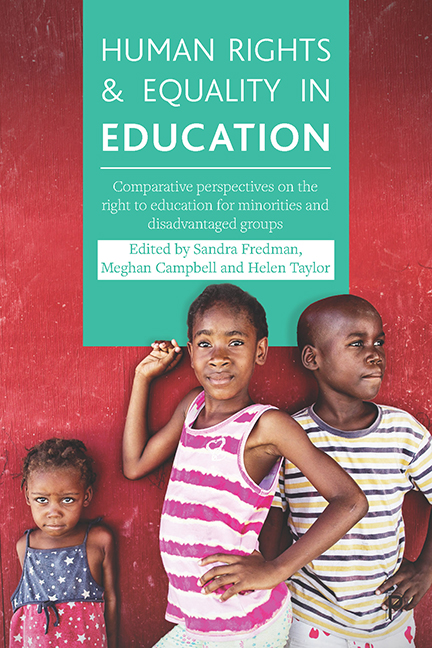 Human Rights and Equality in Education
Human Rights and Equality in Education Book contents
- Frontmatter
- Contents
- Notes on contributors
- Foreword
- Human rights and equality in education: Introduction
- Part I The role of public and private actors in education
- Part II Balancing the right to freedom of religion and culture and the right to education
- Part III Gender equality in education: moving beyond access to primary education
- Part IV Litigating for quality and equality in education
- Index
five - The challenge of Afrikaans language rights in South African education
Published online by Cambridge University Press: 19 April 2022
- Frontmatter
- Contents
- Notes on contributors
- Foreword
- Human rights and equality in education: Introduction
- Part I The role of public and private actors in education
- Part II Balancing the right to freedom of religion and culture and the right to education
- Part III Gender equality in education: moving beyond access to primary education
- Part IV Litigating for quality and equality in education
- Index
Summary
Introduction
International human rights law affords linguistic minorities the right to education in the language of their choice. It is an important right, both because home language education is generally more effective, and because educational institutions are vital for maintaining minority communities. South Africa too guarantees a (limited) right to education in the language of one's choice. But for one particular minority community, the Afrikaners, the protection of that right is complicated by South Africa's history of racial inequality, particularly in the area of education. As Moseneke DCJ has put it:
It is so that white public schools were hugely better resourced than black schools. They were lavishly treated by the apartheid government. It is also true that they served and were shored up by relatively affluent white communities. On the other hand, formerly black public schools have been and by and large remain scantily resourced. They were deliberately funded stingily by the apartheid government. Also, they served in the main and were supported by relatively deprived black communities. That is why perhaps the most abiding and debilitating legacy of our past is an unequal distribution of skills and competencies acquired through education.
As a result of this history of inequality, Black learners today receive, on average, a substantially lower quality of education than their White counterparts. This manifests in the nature of the infrastructure, the learner-to-teacher ratios and the quality of teachers. White children go to schools with excellent facilities and low numbers of students to well-trained teachers. Black children experience the opposite.
In this chapter, I explore how the unique South African context affects the way that we evaluate the right to own-language education of the White Afrikaans minority. I argue that it is not possible to apply the ordinary principles concerning minority languages to Afrikaans. But that does not mean that Afrikaners are not entitled to some protection for their language. Rather, it requires looking for compromises and innovative solutions that acknowledge both the position of privilege built on a history of racial discrimination, and the legitimate demand for protecting Afrikaans-language education.
The argument is structured in three parts. The next section expands on the nature of the problem and how it has manifested in some recent events. The following one looks at the Constitution and how it attempts to mediate between the competing demands.
- Type
- Chapter
- Information
- Human Rights and Equality in EducationComparative Perspectives on the Right to Education for Minorities and Disadvantaged Groups, pp. 71 - 96Publisher: Bristol University PressPrint publication year: 2018


